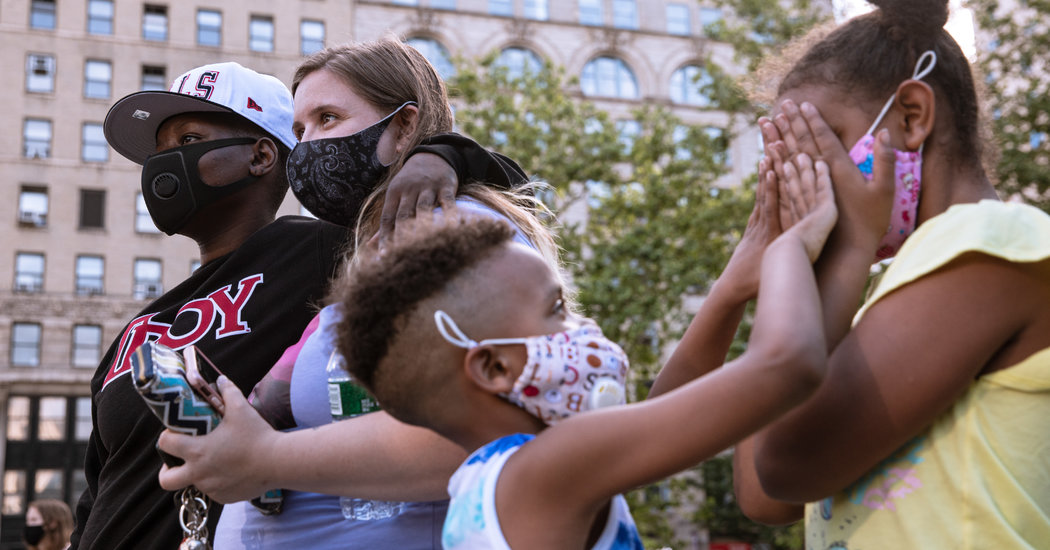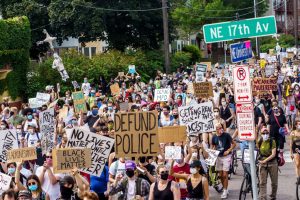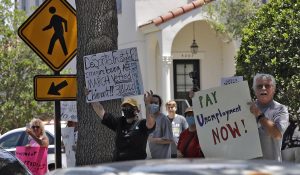Thousands of people are expected to flood New York City’s parks, plazas and streets on Friday morning in celebration of Juneteenth, an annual holiday that until recent protests was, outside of black communities, not widely recognized.
But demonstrations against police brutality following the police killing of George Floyd in Minneapolis have grown into a broader, national conversation on racism. Juneteenth, which commemorates the end of slavery in the United States, has taken on even more significance for a country grappling with its racist past and present.
Companies, organizations and politicians are embracing Juneteenth, which has gained more support to become a national holiday. Gov. Andrew M. Cuomo issued an executive order this week recognizing Juneteenth as a holiday for state employees.
On Friday, Mayor Bill de Blasio announced that next year Juneteenth will become an official city and school holiday.
“I’m sorry that it took all of this, but I’m glad it’s finally being given some recognition,” said Cordell Cleare, a community activist who serves on the Juneteenth Committee of Masjid Malcolm Shabazz in Harlem, which will hold its 27th celebration on Saturday. “It’s sad and joyful at the same time.”
Parades and festivals are currently banned in New York City to stop the spread of the coronavirus so organizers of the annual Juneteenth parade and festival in Harlem feared the event would be canceled or muted. There will be no floats this year.
Organizers had planned a walk, but the interest generated amid protests and discussions about the legacy of racism has them bracing for a large crowd.
“It wasn’t going to be at all because of coronavirus,” Ms. Cleare said. “This is being done in the form of a walk and rally for this to become a holiday. We just morphed everything into a walk and a cry for justice for getting a holiday and all that comes with that. We’re going to float these feet.”
Ms. Cleare said she would be busy on Friday planning for the event, which will be held on Saturday as it usually is, but added that she could not believe how many marches and rallies were planned. “We were alone. We would be by ourselves. It would be just us out here talking about it,” she said.
Among the dozens of events around the city will be a march and rally at 2 p.m. in Cadman Plaza in Downtown Brooklyn and a motorcade that will travel from Grand Army Plaza in Brooklyn to Harlem.
The caravan — which will include Representatives Alexandria Ocasio-Cortez and Hakeem Jeffries and the public advocate, Jumaane Williams — will start at 11:30 a.m. at Grand Army Plaza, then stop at City Hall for a rally on its way to Harlem where it will end at 125th Street and Adam Clayton Powell Boulevard Jr. Boulevard.
Kira Y, 25, from Williamsburg, who did not want to share her full name because of safety concerns, said she did not know about Juneteenth until this year. She had noticed the holiday on her calendar but never knew what it was really about. “I didn’t know about it, I didn’t learn about it in school,” she said, “and so I had to educate myself. And I’m black.”
Though Mr. Cuomo’s decision to recognize the holiday for state workers was a notable achievement, Kira says it only further motivated her to keep protesting: “It makes me wonder — what more can we ask for?”
Isaac Ortega, 21, of New Jersey, and Brannon Bridgett, 23, of Manhattan, began protesting in May following Mr. Floyd’s killing. Both said they had learned about Juneteenth in global history class in high school but Mr. Bridgett says he only started celebrating it in college. Mr. Ortega said he hasn’t celebrated it yet but will now. Both plan to protest on Friday.
Mr. Cuomo’s order was a good first step, but Mr. Bridgett said, “I think it should be a federal holiday.”
Mr. Ortega agreed. “I think it’s symbolic. I think that’s the crumbs, but I want the whole cake,” he said, referring to a list of police reforms he believes are needed. “This country was built on the backs of enslaved people and the country hasn’t reckoned with that.”
With more people expected to mark the holiday on Friday, black people who have long celebrated want the public to better understand it.
On June 19, 1865, a Union general, who had arrived in Galveston, Tex., read aloud General Order No. 3 informing enslaved people there that the Emancipation Proclamation had freed them. That freedom was not cut and dried. Slavery would not be abolished until the 13th Amendment was later ratified, and discrimination and violence against black people continued.
In an interview, Mary Elliott, curator of American slavery at the National Museum of African American History and Culture, read the order aloud and emphasized the end of the order. “Former masters and slaves” would become “employer and hired labor.”
“The Freedmen,” Ms. Elliott continued reading, “are advised to remain at their present homes and work for wages. They are informed that they will not be allowed to collect at military posts; and they will not be supported in idleness either there or elsewhere.”
“That basically says you’re free,” she said, “but you best know your place.”
The day should be about celebration, reflection and action, Ms. Elliott said.
“I would hate for this moment to go by like, this is for the black people. No, this is for Americans,” she said. “It is very much an intimate holiday for African Americans, but stop and reflect on the meaning of freedom in this country and the application of it.”
Ronald E. Goodwin, history program coordinator at Prairie View A&M University in Texas, recalled wearing a Juneteenth T-shirt once when he visited San Antonio, his hometown.
His mother, he remembered, recoiled and said about the holiday: “I always hated it.” The holiday made her remember segregation because growing up in her community, black people were only allowed in public parks for holidays, like Juneteenth, he said.
“Black Independence Day. Freedom Day,” he said. “All of that sounds great on a bumper sticker, but the reality is that a lot of people were not freed.”
Mr. Goodwin continued: “Just because you say I’m free doesn’t mean I’m equal. There’s an element out here that will look at my black skin. That didn’t change in 1865, and there’s still a question of whether that will happen today.”
Melissa Guerrero contributed research.



















